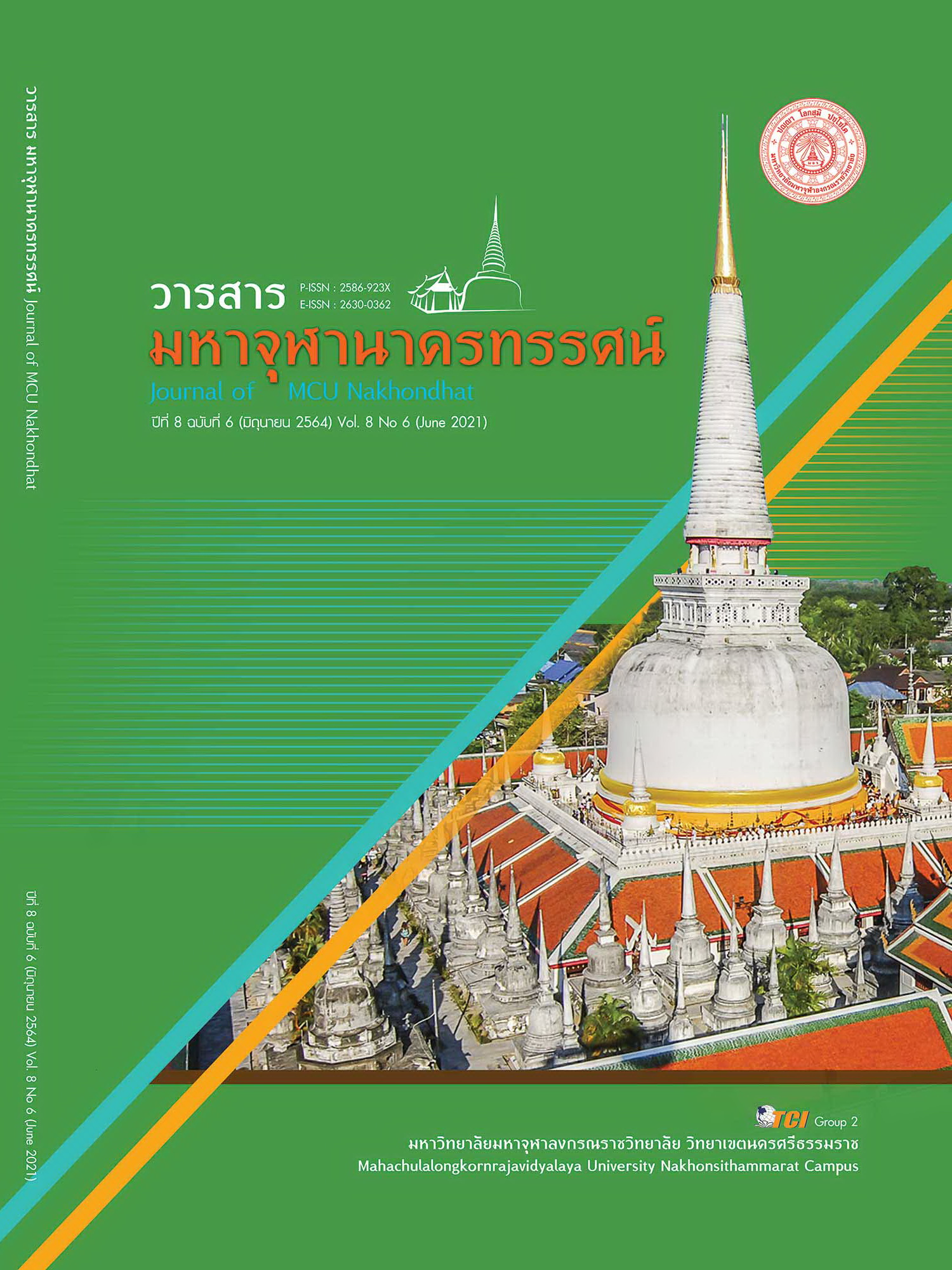PARTICIPATION IN THE PLANNING AND REFORM OF BUDDHIST AFFAIRS
Main Article Content
Abstract
That Buddhist institution It is one of the most important institutions in Thai society Most Thai people are Buddhists and maintain oneself according to the teachings of Buddhism. There is a monk who is the leader in spreading the teachings of the Buddha. The monks are one of the important Buddhist companies and Buddhism will create stability. Can be sustainable Also relying on the Buddhist Company 4 to help sustain by behaving according to the principles, teachings of the Buddha, according to the wisdom at least five precepts must be adhered to as the basis for the life of the lay person. The BanchitMust strive in the threefold meditation, meditation and wisdom. If you can do as follows Buddhism has a contribution to Thai society because most of the people are Buddhists. When Buddhism is stable and united other religions will also gain merit. and can exist for the benefit of humanity as well. As for the reform of Buddhist affairs, it is to sustain Buddhism. by reorganizing the system, to achieve mobility, Keep up with the changing situation of the country. even if it affects the image of confidence but for the prosperity of Buddhism in the future, considered very cost effective, because it is in line with the Buddhist principle that, giving up assets to maintain organs Relinquish organs to save life and sacrificed his life to keep it right.
Article Details
References
คณะสงฆ์จังหวัดแพร่. (2560). แผนยุทธศาสตร์การปฏิรูปกิจการพระพุทธศาสนาจังหวัดแพร่ 2561-2564. เรียกใช้เมื่อ 25 มกราคม 2564 จาก https:// www. แผนยุทธศาสตร์การปฏิรูปกิจการพระพุทธศาสนาจังหวัดแพร่ 2561-2564
นิรันดร์ จงวุฒิเวศย์. (2531). กลวิธีแนวทางวิธีการส่งเสริมการมีส่วนร่วมของประชาชนในงานพัฒนาชุมชน การมีส่วนร่วมของประชาชนในการพัฒนาชนบท. กรุงเทพมหานคร: ศักดิ์โสภาการพิมพ์.
ปรัชญา เวสารัชช์. (2528). การมีส่วนร่วมของประชาชนในกิจกรรมเพื่อพัฒนาชนบท. สถาบันไทยคดีศึกษา. กรุงเทพมหานคร: มหาวิทยาลัยธรรมศาสตร์.
พจนานุกรมฉบับราชบัณฑิตยสถาน. (2554). การปฏิรูป (Reform). เรียกใช้เมื่อ 26 ธันวาคม 2563 จาก https://library.mju.ac.th/pr/?p=12048
พระครูวิสุทธิสีลาภิวัฒน์ และคณะ. (2563). การขับเคลื่อนแผนยุทธศาสตร์การปฏิรูปกิจการพระพุทธศาสนาด้านการปกครองของคณะสงฆ์จังหวัดสระบุรี. วารสาร มจร สังคมศาสตร์ปริทรรศน์, 9(1), 69-81.
พระธรรมปริยัติโสภณ (วรวิทย์ คงฺคปญฺโญ). (2548). การคณะสงฆ์และการพระศาสนา (พิมพ์ครั้งที่ 3). กาญจนบุรี: นักพิมพ์ธรรมเมธี–สหายพัฒนาการพิมพ์.
พระราชวรเมธี, ดร. และคณะ. (2560). แผนยุทธศาสตร์การปฏิรูปกิจการพระพุทธศาสนา 2560-2564. “การนำนโยบายสู่การปฏิบัติ”. เรียกใช้เมื่อ 21 มกราคม 2564 จาก http://www.buddhism4. com/web/index.php/9-1/3-2017-10-21-19-11-43
เมตต์ เมตต์การุณ์จิต. (2544). การมีส่วนร่วมในการบริหารโรงเรียนของคณะกรรมการศึกษาประจำโรงเรียนเทศบาล ในจังหวัดนครราชสีมา. ใน วิทยานิพนธ์ปริญญามหาบัณฑิต สาขาวิชาการบริหารการศึกษา. มหาวิทยาลัยสุโขทัยธรรมาธิราช.
วรรณิการ์ ภูมิวงศ์พิทักษ์. (2540). ปัญหาและอุปสรรคของการมีส่วนร่วมของประชาชนในโครงการครอบครัวและชุมชนพัฒนา หน้า ศึกษาเฉพาะกรณีชุมชนดวงแข เขตปทุมวัน กรุงเทพมหานคร. ใน วิทยานิพนธ์สังคมสงเคราะห์ศาสตรมหาบัณฑิต สาขาบริหารและนโยบายสวัสดิการสังคม. มหาวิทยาลัยธรรมศาสตร์.
อาภรณ์พันธ์ จันทร์สว่าง. (2542). คำอธิบายลักษณะวิชาทฤษฎีและหลักการพัฒนาชุมชน. กรุงเทพมหนคร: มหาวิทยาลัยเกษตรศาสตร์.
Preecha Bunthavee. (2562). Reformation: The NCPO’s Concept based on Jacques Derrida’s Deconstruction Theory. วารสาร มจร สังคมศาสตร์ปริทรรศน์, 18(3), 267-280.
Surasuk Visuddhajaro. (2559). Temple management strategies for stability on buddhist. วารสารสันติศึกษาปริทรรศน์ มจร, 3(1), 130-143.


